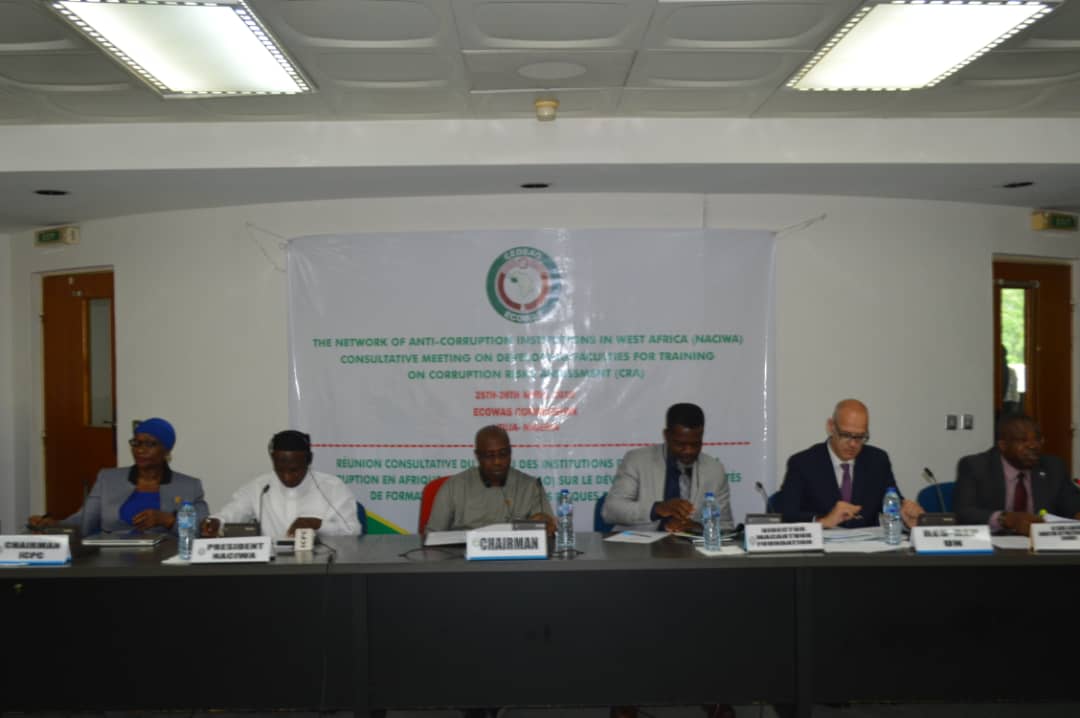There are plans to adopt the Anti-Corruption Academy of Nigeria (ACAN), the Independent Corrupt Practices and Other Related Offences Commission’s (ICPC) training and research arm as a centre of excellence in corruption studies especially in the area of Corruption Risks Assessment (CRA).
This emerged as part of the resolutions at the end of the Consultative Meeting by the Network of Anti-Corruption Institutions in West Africa (NACIWA) to Develop Faculties for Training on Corruption Risks Assessment, which held at the ECOWAS Commission in Abuja recently. Some participants spoke glowingly on the efforts of ICPC and one of its prime prevention tools, the CRA which provides a basis for the need to apply the tool in the wider sub-region.
Speaking during the meeting, the Director, Political Affairs, ECOWAS Commission, Dr. Remi Ajibewa, laid emphasis on adopting the preventive approach such as CRA in fighting the scourge of corruption as provided for in Article 5 of ECOWAS protocol.
Dr. Ajibewa who spoke through the Head, Democracy and Good Governance Division of ECOWAS Commission, Eyesan Okorodudu, noted that the welfare of citizens had dwindled significantly due to the corrosive effects of corruption, and therefore expressed gratitude to ICPC for collaborating with the West African regional body to stem the tide of corruption within the sub-region.
Speaking in the same vein, Walter Amewu of Economics and Organised Crimes Office (EOCO), Ghana and Thiendella Babou, Chief of Department of Administration and Finance, Senegal, respectively revealed that because of the success story of ICPC’s research and training institute, their respective countries were already working on establishing their own anti-corruption academies to be modelled after the Anti-Corruption Academy of Nigeria (ACAN).
In his keynote address, ICPC Chairman, Professor Bolaji Owasanoye, who was represented by the ACAN Provost, Professor Sola Akinrinade, spoke on the importance of CRA and other prevention initiatives: “We believe that prevention is vital to controlling and eradicating corruption as it is generally acknowledged that prevention is better than cure. Our prevention tool includes Systems Study and Review, and Corruption Risk Assessment (CRA). Systems Study and Review involves examining particular systems and procedures of government that are prone to corruption and advising and/or directing affected agencies of government to review their operations to tackle identified problems. Corruption Risk Assessment is an extended version of system studies and reviews but with some proactivity.”
He also revealed that 115 Federal Ministries, Departments and Agencies (MDAs) were currently having their personnel costs and capital expenditures examined and reviewed by the Commission through system study to ascertain their levels of budget implementation, and integrity of project execution for 2017 and 2018.
The Chairman stated that the adverse effects of corruption on the sub-region in particular and the African continent in general were alarming and that it required collaborative effort to purge the continent of the scourge.
He therefore called on the participating anti-corruption agencies to take advantage of the meeting to forge synergies, to network and share experiences as well as intelligence not just on corrupt practices, but on how to build capacities in their respective states in order to check the menace.
In her paper presentation during the meeting on, “Corruption Risk Assessment as a Veritable Tool for Promoting Integrity Governance in Public Service Delivery,” the Director, Public Enlightenment Department and Spokesperson of ICPC, Mrs. Rasheedat Okoduwa, mni, explained that “CRA is a process of identifying system weaknesses that could lead to corruption and what effect such corruption might have in order to avoid or mitigate the negative consequences.”
Mrs. Okoduwa pointed out that the goal of CRA was to develop an integrity plan to strengthen accountability and transparency towards checking corruption and institutionalising integrity.
Some of the benefits of CRA highlighted by the Commission’s spokesperson include: raising trust that public institutions are carrying out their functions with integrity; reinforcement of coherence and quality of governance in organisations; and strengthening ethical and governance standards.
Mrs. Okoduwa also listed some challenges of the exercise to include: funding; lack of management buy-in; and fear of ICPC as a prosecuting agency by MDAs.
Earlier in his welcome remarks at the meeting, the President of NACIWA, Mr. Moumouni Guindo, who was represented by the Deputy Executive Secretary, National Agency for the Fight Against Corruption and Promoting Good Governance, Republic of Guinea, Mr. Sekou Mohammed Sylla, underscored the importance of CRA training, saying it was necessary for undertaking preventive measures against corruption.
Also, in his goodwill message during the meeting, United Nations Office on Drugs and Crime, (UNODC) Country Representative, Mr. Oliver Stolpe, who stood in for the Country Director, UNDP Nigeria Office, emphasized the need for partnership with the media, Civil Society Organisations (CSOs) and the leadership of the agencies to be assessed, saying that it was a recipe for success in the anti-corruption drive.
Mr. Stolpe submitted that without the genuine support of the leadership of the organisations where CRAs are to be conducted, it would be difficult, if not completely impossible, to achieve desired results.
In another goodwill message, Mr. Dayo Laide who represented Kole Shettima of MacArthur Foundation, said that CRA has gained grounds as an important tool in the fight against corruption and building ethical values. He pledged the Foundation’s commitment to supporting anti-corruption initiatives.
The Consultative Meeting which was convened by the ECOWAS Commission attracted participants from Nigeria; Guinea Bissau; Niger; Guinea; Burkina Faso; Cote D’Ivoire and Liberia. Others were: Sierra Leone, Senegal; Ghana; Togo; and Mali.
Some other resolutions of the meeting were: to enforce various anti-corruption laws; sensitise the public against the ugly trend; advocate for Standard Operating Procedures and Codes of Ethics for member states; and localise the anti-corruption struggle so that those at the grassroots can own the fight, monitor and demand for accountability from their leaders.
It also emphasized the need for special courts to try corruption matters as well as the expansion of the jurisdiction of ECOWAS criminal court to cover corruption cases.


